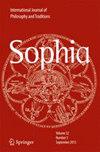A New Day for Perennialism: the Case for a Perennial Phenomenology, or ‘Soft’ Perennialism
IF 0.5
3区 哲学
0 PHILOSOPHY
引用次数: 0
Abstract
Abstract This paper argues for a ‘perennial phenomenology’ (or ‘soft’ perennialism) varying from the traditionalist notion of a ‘perennial philosophy.’ Perennial phenomenology offers a more nuanced form of perennialism that focuses on spiritual/mystical experiences rather than the teachings and beliefs of different religions. While teachings and beliefs vary greatly, the mystical experiences associated with different mystical traditions have striking commonalities. I suggest four experiential aspects that support a perennial phenomenology. These aspects also necessitate a reconsideration of the debate between perennialism and constructivism. Significantly, these experiential elements are present when mystical experiences occur outside the context of spiritual traditions, to people who know little or nothing about spirituality and consider themselves non-religious. Treating mystical experiences exclusively in the context or religion and spiritual traditions has been a major failing in debates between constructivists (or contextualists) and perennialists. There is a common landscape of mystical experience that precedes interpretation and conceptualization by spiritual traditions. This paper contributes to a reopening of discussion about perennialism that has been underway in recent years.多年生主义的新一天:多年生现象学或“软”多年生主义的案例
摘要本文主张一种“常年生现象学”(或“软”常年生主义),与传统的“常年生哲学”概念不同。“常年生现象学提供了一种更微妙的常年生主义形式,它关注的是精神/神秘体验,而不是不同宗教的教义和信仰。”虽然教义和信仰差异很大,但与不同神秘传统相关的神秘体验具有惊人的共性。我提出了四个经验方面来支持常年性现象学。这些方面也需要重新考虑永恒主义和建构主义之间的争论。值得注意的是,当神秘体验发生在精神传统的背景之外时,这些体验元素就会出现在那些对灵性知之甚少、认为自己没有宗教信仰的人身上。在建构主义者(或情境主义者)和永恒主义者之间的争论中,只在宗教和精神传统的背景下处理神秘体验是一个主要的失败。在精神传统的解释和概念化之前,有一种神秘体验的共同景观。这篇论文有助于重新讨论近年来一直在进行的多年生主义。
本文章由计算机程序翻译,如有差异,请以英文原文为准。
求助全文
约1分钟内获得全文
求助全文
来源期刊

Sophia
PHILOSOPHY-
CiteScore
0.60
自引率
0.00%
发文量
44
期刊介绍:
Sophia is now published by Springer. The back files, all the way to Volume 1:1, are available via SpringerLink! Covers both analytic and continental philosophy of religionConsiders both western and non-western perspectives, including Asian and indigenousIncludes specialist contributions, e.g. on feminist and postcolonial philosophy of religionSince its inception in 1962, Sophia has been devoted to providing a forum for discussions in philosophy and religion, focusing on the interstices between metaphysics and theological thinking. The discussions take cognizance of the wider ambience of the sciences (''natural'' philosophy and human/social sciences), ethical and moral concerns in the public sphere, critical feminist theology and cross-cultural perspectives. Sophia''s cross-cultural and cross-frontier approach is reflected not only in the international composition of its editorial board, but also in its consideration of analytic, continental, Asian and indigenous responses to issues and developments in the field of philosophy of religion.
 求助内容:
求助内容: 应助结果提醒方式:
应助结果提醒方式:


